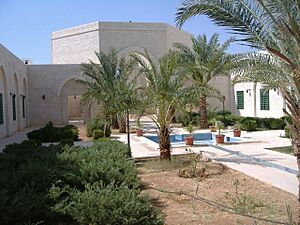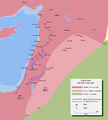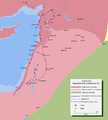Abu Ubaidah ibn al-Jarrah facts for kids
Quick facts for kids
Abu Ubaidah ibn al-Jarrah
Amin ul Ummah
(The Custodian of Ummah) |
|
|---|---|
 |
|
| Governor of the Levant | |
| In office 634–639 |
|
| Monarch | Umar Ibn al-Khattab |
| Preceded by | Office established |
| Succeeded by | Muawiyah I |
| Commander-in-chief of the Rashidun Army |
|
| In office 634–639 |
|
| Appointed by | Umar Ibn al-Khattab |
| Monarch | Umar Ibn al-Khattab |
| Preceded by | Khalid Ibn Walid |
| Personal details | |
| Born | 583 Mecca |
| Died | 639 (aged 55–56) / 18 AH Jordan Valley (Middle East) |
| Spouses |
|
| Children |
|
| Parent | 'Abdullah ibn al-Jarrah (father) |
| Military service | |
| Allegiance | Rashidun Caliphate |
| Branch/service | Rashidun army |
| Years of service | 632–639 |
| Rank | Field Commander (632–634) Commander-in-chief (634–639) |
| Battles/wars | Muslim-Quraysh Wars Rashidun conquest of Levant |

Abu Ubaidah ibn al-Jarrah (born in 583 CE, died in 639 CE) was a very important person in early Islamic history. He was one of the close friends and followers of the Islamic prophet Muhammad. People often remember him as one of the "Ten Promised Paradise," which means he was among a special group of people who were told they would go to heaven.
Abu Ubaidah was a skilled military leader. He commanded a large part of the Rashidun Army during the time of the second Caliph (leader) Umar. He was also considered a possible successor to Umar as the next Caliph.
Contents
Who Was Abu Ubaidah?
Abu Ubaidah's full name was Abū ‘Ubaydah ‘Āmir ibn ‘Abdillāh ibn al-Jarāḥ. He was born in Mecca, a city in what is now Saudi Arabia. He became a Muslim early on and was known for his honesty and trustworthiness.
His Role as a Commander
Abu Ubaidah played a key role in many important battles and conquests. He was a field commander from 632 to 634 CE. Later, he became the Commander-in-chief of the Rashidun Army from 634 to 639 CE. This made him the top military leader.
Conquest of the Levant
One of his most famous achievements was leading the Rashidun conquest of the Levant. The Levant is a historical area that includes modern-day Syria, Lebanon, Jordan, Palestine, and Israel. He was appointed as the Governor of the Levant in 634 CE and held this position until his death in 639 CE. His leadership helped expand the early Islamic state.
Important Battles and Leadership
Abu Ubaidah was involved in many significant battles. These battles helped shape the early Islamic empire.
The Battle of Yarmouk
One of the most famous battles he led was the Battle of Yarmouk in 636 CE. This was a major battle against the Byzantine Empire. The Muslim army, under Abu Ubaidah's command, won a decisive victory. This win was very important because it secured Muslim control over much of Syria.
Other Key Campaigns
He also participated in other important campaigns, such as the Battle of Badr, Battle of Uhud, and the Conquest of Mecca. His bravery and strategic skills were highly valued by the Muslim leaders.
His Legacy and Death
Abu Ubaidah was known for his humble nature and strong faith. He was respected by both his soldiers and the people he governed. He died in 639 CE during a plague that affected the region. His death was a great loss for the early Muslim community.
His shrine is located in Deir Alla in Jordan, where people still visit it today.
Images for kids
See also
 In Spanish: Abu Ubáidah ibn al-Yarrah para niños
In Spanish: Abu Ubáidah ibn al-Yarrah para niños
 | Audre Lorde |
 | John Berry Meachum |
 | Ferdinand Lee Barnett |




